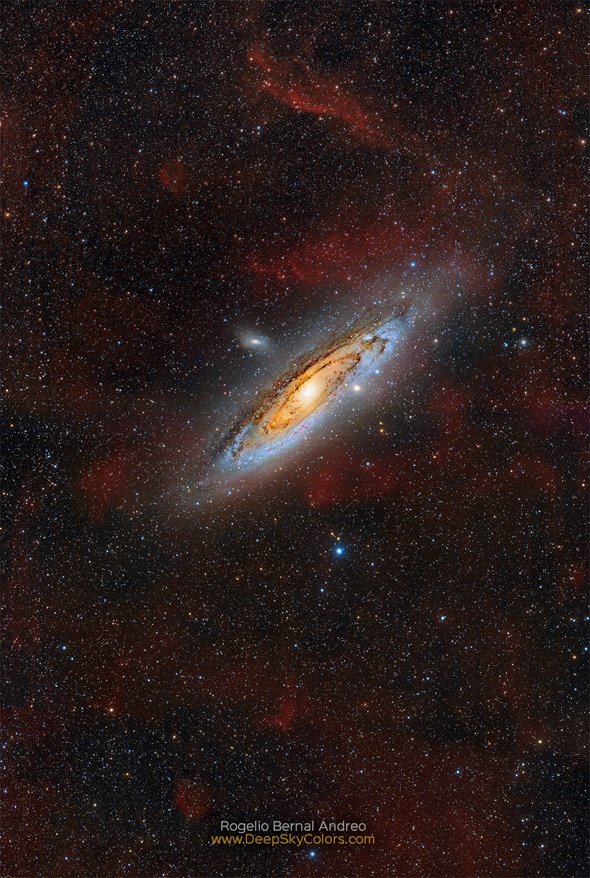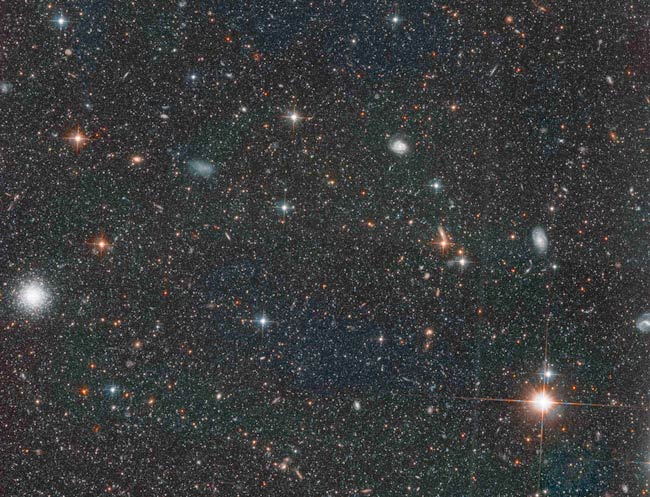Page 1 of 1
APOD: M31: The Andromeda Galaxy (2019 Sep 09)
Posted: Mon Sep 09, 2019 4:06 am
by APOD Robot
 M31: The Andromeda Galaxy
Explanation:
M31: The Andromeda Galaxy
Explanation: How far can you see? The most distant object easily visible to the unaided eye is M31, the great
Andromeda Galaxy, over two million
light-years away. Without a telescope, even this immense
spiral galaxy appears as an unremarkable, faint,
nebulous cloud in the
constellation Andromeda. But a bright yellow nucleus, dark winding dust lanes, luminous blue spiral arms, and bright red emission nebulas are recorded in
this stunning six-hour telescopic digital mosaic of our closest major galactic neighbor. While even
casual skygazers are now inspired by the knowledge that there are many distant galaxies like M31, astronomers seriously debated this fundamental concept
only 100 years ago. Were these "spiral nebulae" simply outlying gas clouds in our own
Milky Way Galaxy or were they "island universes" -- distant galaxies of stars comparable to the
Milky Way itself? This question was central to the famous
Shapley-Curtis debate of 1920, which was later resolved by observations favoring Andromeda being just like our
Milky Way Galaxy -- a conclusion making
the rest of the universe much more vast than many had ever imagined.
Re: APOD: M31: The Andromeda Galaxy (2019 Sep 09)
Posted: Mon Sep 09, 2019 4:28 am
by Cousin Ricky
That’s the deepest photo I’ve ever seen of M32 and M110.
Re: APOD: M31: The Andromeda Galaxy (2019 Sep 09)
Posted: Mon Sep 09, 2019 5:10 am
by Ann
Today's APOD is a very fine image, and I very much appreciate the effort that went into making it.
Of the many things I like about it, note how the disk of Andromeda turns non-blue at far upper left as the disk is running out of young blue stars. And yet there is a red emission nebula at 10 o'clock, signalling fresh star formation.
Milky Way globular Pal 5 and its stellar stream.S.E. Koposov, D. Erkal,
V. Belokurov (IoA, Cambridge) with data from the Sloan Digital Sky Survey
The Andromeda Galaxy seen through faint emission nebulosity in the Milky Way.
Photo: Rogelio Bernal Andreo.
Note the tidal tails of NGC 205, the satellite galaxy seen below Andromeda in this picture. The tidal tails stretch towards and seemingly away from M31. Eventually NGC 205 may give rise to a stellar stream going around Andromeda, as its stars are stretched into long bands around the large galaxy, as the main body of NGC 205 slowly "evaporates".
Also note the red flecks of nebulosity "outside" the Andromeda Galaxy in today's APOD. These flecks are part of a faint Hα background of the Milky Way.
Ann
Re: APOD: M31: The Andromeda Galaxy (2019 Sep 09)
Posted: Mon Sep 09, 2019 5:23 am
by Boomer12k
Stunning image... it is somewhat diffuse around the edges...is this due to gravitational influences from the Milky Way, or one of its own satellites?
:---[===] *
Re: APOD: M31: The Andromeda Galaxy (2019 Sep 09)
Posted: Mon Sep 09, 2019 6:04 am
by Ann
Boomer12k wrote: ↑Mon Sep 09, 2019 5:23 am
Stunning image... it is somewhat diffuse around the edges...is this due to gravitational influences from the Milky Way, or one of its own satellites?
:---[===] *
I think that the "fuzziness" of the outer disk of Andromeda has nothing to do with gravity, but rather with the fact that the outer disk gradually blends into the "background".
Stars that are gravitationally bound to the Andromeda Galaxy are found far beyond the visible disk.
APOD Robot wrote:
Andromeda's halo stars turned out to be have a wider range of ages than our Milky Way's halo stars, likely indicating more encounters with small neighboring galaxies.
Ann
Re: APOD: M31: The Andromeda Galaxy (2019 Sep 09)
Posted: Mon Sep 09, 2019 11:32 am
by orin stepanek
So Beautiful! Gotta love Andromeda!

Re: APOD: M31: The Andromeda Galaxy (2019 Sep 09)
Posted: Mon Sep 09, 2019 11:57 am
by neufer
.
Hopefully soon, WFIRST will be able to produce similar wide images from space:
https://en.wikipedia.org/wiki/Wide_Field_Infrared_Survey_Telescope wrote:
<<The Wide Field Infrared Survey Telescope (WFIRST) is a NASA infrared space observatory currently under development. WFIRST was recommended in 2010 by United States National Research Council Decadal Survey committee as the top priority for the next decade of astronomy. On February 17, 2016, WFIRST was approved for development and launch.
WFIRST is based on an existing 2.4 m wide field-of-view telescope and will carry two scientific instruments.
The Wide-Field Instrument is a 288-megapixel multi-band near-infrared camera, providing a sharpness of images comparable to that achieved by the Hubble Space Telescope (HST) over a 0.28 square degree field of view, 100 times larger than that of the HST.>>
Largest M31 Hubble Space Telescope mosaic:
https://www.nasa.gov/content/goddard/hu ... eda-galaxy
Re: APOD: M31: The Andromeda Galaxy (2019 Sep 09)
Posted: Mon Sep 09, 2019 2:37 pm
by sillyworm 2
Crazy Beautiful! Just imagine the details yet to come. Our current pictures of Jupiter as an example.So much exciting information to look forward to!
Re: APOD: M31: The Andromeda Galaxy (2019 Sep 09)
Posted: Mon Sep 09, 2019 10:58 pm
by saturno2
Beautiful image very beautiful
Re: APOD: M31: The Andromeda Galaxy (2019 Sep 09)
Posted: Tue Sep 10, 2019 1:32 am
by TheOtherBruce
Very nice; I think this is the deepest image of M31 I've seen. I remember the first photos I saw in astronomy books still had M32 visually distinct from the main disk, with none of the faint detail of the arm fringes seen here.
It's tantalising, I can almost see detail in the core since we've got such a good viewing angle, but it's just too bright. Can't imagine what the night sky would look like in there.
 M31: The Andromeda Galaxy
M31: The Andromeda Galaxy

